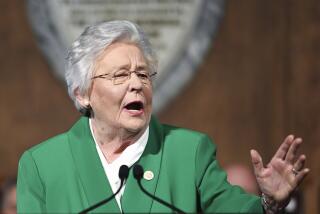Academic Pressure on Youngsters May Not Be Beneficial, Study Says
- Share via
Pushing elementary-age children into rigorous study in the name of tougher educational standards is doing more harm than good, warns a new report that lays part of the blame on global economic pressures that have aroused competitive fervor.
Recent changes aimed at making students more accountable and diligent may make sense for high schoolers, but often produce only short-term gains when applied to younger children and may actually burn them out, said the report being released Friday in Chicago at the annual convention of the National Assn. of State Boards of Education.
Early Childhood Units
The study, “Right From the Start: The Report of the NASBE Task Force on Early Childhood Education,” urges states instead to encourage formation of “early childhood units” catering to the special developmental needs of 4- to 8-year-olds.
“The legitimate concern about the link between our economic future and the quality of schooling has fostered a competitive mentality for our educational enterprise, with unfortunate consequences for early segments of schooling,” the report said.
“If education is seen as a contest that pits children against their peers, or a race against our foreign competitors, we risk teaching very young children the wrong academic tasks before they are ready, and we stimulate fears and pressure among parents,” it added.
The 26-member task force that produced the report was chaired by association President Richard Owens. It met throughout 1988, holding hearings and visiting schools in Atlanta, Boston, Chicago and San Francisco.
The report lends fresh support to the growing chorus of concern over increased standardized testing, ability tracking and rigid academic demands on elementary school children in some parts of the country. It echoes similar concerns raised during the last year by groups including the National Assn. of Elementary School Principals and the National Assn. for the Education of Young Children. The report didn’t single out any states or districts for criticism.
The proposed special units for children aged 4 to 8 might be entirely separate from existing elementary schools, or else schools could choose to designate a separate early childhood unit director responsible to the school principal. Elementary schools might also set up a team of one or more lead teachers.
Such units, the task force said, should aim to foster strong parent-school partnerships, coordinate its services with other community agencies serving youngsters, provide training and support for teachers and administrators, and respect students’ cultural and linguistic diversity.
The units “will supply the element missing in the school reform--a focus on how children learn and develop,” the report said.
More to Read
Sign up for Essential California
The most important California stories and recommendations in your inbox every morning.
You may occasionally receive promotional content from the Los Angeles Times.










